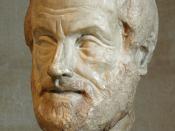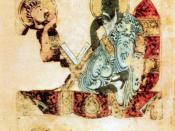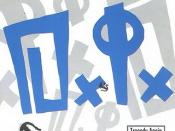According to Aristotle, poetry, along with other art forms, is based, more than anything, in man's "instinct" of imitation. Tragedy, which Aristotle regards as a superior form of drama, is a particular type of this imitation which follows specific formulas in order to achieve its goals. Tragedy "is an imitation of an action that is serious, complete and of a certain magnitude." It uses "artistic" language of different kinds which are found within "separate parts of the play."
Tragedy relates "what may happen." It uses the character's nature to show the way in which he would act in a given situation. A good tragedy's central goal is to invoke pity and fear within its audience, causing catharsis, or the purgation, or purification of emotion through vicarious experience. The audience members relate to the character's hamartia, or tragic flaw, and by following the plot without having to actually live through events which would cause them suffering, or catastrophe, they are able to cleanse themselves of their own hamartia.
Therefore, there are certain elements in a tragedy that are particularly vital.
Aristotle deems the plot the "soul of tragedy." Tragedy, after all, is an "imitation of action." Thus, this "action," the plot, becomes the vicarious experience which will essentially cause the audience's catharsis. The plot must follow a certain structure in order to achieve its purpose. It must be "whole;" it must have a beginning, middle, and end, which flow in a natural manner. The length is also significant; a play can be long as long as it is comprehensible. Also, the play should focus on one action, not all the actions in the character's life. Tragedy is an imitation of "events inspiring fear or pity." These feelings are achieved by "reversal of the situation" and "recognition." A reversal of...


